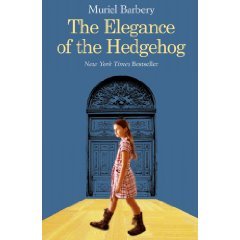
This picture has absolutely NOTHING to do with Elizabeth Strout's novel,
Olive Kitteridge. However, I picture Olive as a kind of big, strong, stoic Vanessa Redgrave-ish looking woman, and Erin already provided a pic of the cover, so... why not? It was either that or a picture of a scenic Maine coastline, mirroring the setting of the thirteen short stories that make up the novel.
It has been a while (is a month or two a while?) since I have really loved a book, but I truly loved this one. I've always had a soft spot for short story collections, especially ones where a main character reappears throughout, and in this way I was won over merely by the set-up. However, the stories don't disappoint. I'm not going to lie-- they were difficult to read. The characters are lonely, even in the midst of marriages and child-rearing. Infidelity is a common recurrence. although Strout wove these betrayals into her storylines in a way that suggested they were less about deception and lust than they were about filling an infinite hole many people can never fill, and easing an unbearable pain and loneliness. Happy endings are few and far between, but much of what Strout writes (although more extreme than what the day-to-day holds for many of us) carries that ring of truth that I am always seeking in books.
It's easy to dismissively peg the recurring characters early on; easy to paint Olive as a domineering and miserable woman, her husband, Henry, as a long-suffering and kindhearted mate... but to do so would be to oversimplify the love they shared and the complexities of the human experience in general. In most stories, Olive is aggressive, decisive and bitter; but in others, and through the eyes of other characters, we also catch glimpses of compassion, bewilderment, strength, and a deep love for her husband and son. Olive is just one woman among many in her seaside town-- no more or less important than any other-- but reading about her life, and the lives of those around her, filled my heart, giving me both comfort in knowing we're not alone, and a confidence that my life can be better than Olive's if I just keep my arms open to it.
Favorite Passages:
"She understood that Simon was a disappointed man if he needed, at this age, to tell her he had pitied her for years. She understood that as he drove his car back down the coast towards Boston, toward his wife with whom he had raised three children, that something in him would be satisfied to have witnessed her the way he had tonight, and she understood that this form of comfort was true for many people . . . but it was thin milk, this form of nourishment; it could not change the fact that you had wanted to be a concert pianist and ended up a real estate lawyer, that you had married a woman and stayed married to her for thirty years, when she did not ever find you lovely in bed" (58).
"[Olive came across] another photo of him [Henry] in the navy, tall and thin, just a kid, really, waiting for life to begin. You will marry a beast and love her, Olive thought. You will have a son and love him. You will be endlessly kind to townspeople as they come to you for medicine, tall in your white lab coat. You will end your days blind and mute in a wheelchair. That will be your life" (161).
On Olive discovering her potential suitor voted for Bush: "'You voted for him. You, Mr. Harvard, Mr. Brains. You voted for that stinker.' He gave a small bark of a laugh. 'My God, you do have the passions and the prejudices of a peasant.' 'That's it,' said Olive. She began walking, at her pace now. She said over her shoulder, 'At least I'm not prejudiced against homosexuals.' 'No,' he called. 'Just white men with money.' Damn right, she thought" (266).
"What young people didn't know, she thought, lying down beside this man, his hand on her shoulder, her arm; oh, what young people did not know. They did not know that lumpy, aged, and wrinkled bodies were as needy as their own young, firm ones, that love was not to be tossed away carelessly, as if it were a tart on a platter with others that got passed around again. No, if love was available, one chose it, or didn't choose it. And if her platter had been full with the goodness of Henry and she had found it burdensome, had flicked it off crumbs at a time, it was because she had not known what one should know: that day after day was unconsciously squandered" (270).
 Snow Flower and the Secret Fan is the story of two girls in 19th century China who become laotong, or old sames, (basically life-long best friends with a bond that can not be destroyed) before they even meet. The girls, Lily and Snow Flower, communicate with a secret women's writing called nu shu, which they write in letters as well as on a single fan, upon which their story together is written. The book is written from the point of view of Lily, who is now an old woman, reflecting back upon her life.
Snow Flower and the Secret Fan is the story of two girls in 19th century China who become laotong, or old sames, (basically life-long best friends with a bond that can not be destroyed) before they even meet. The girls, Lily and Snow Flower, communicate with a secret women's writing called nu shu, which they write in letters as well as on a single fan, upon which their story together is written. The book is written from the point of view of Lily, who is now an old woman, reflecting back upon her life.















